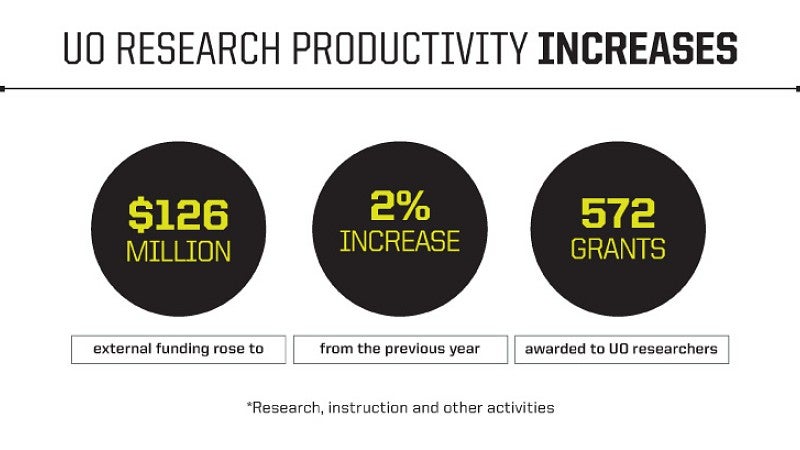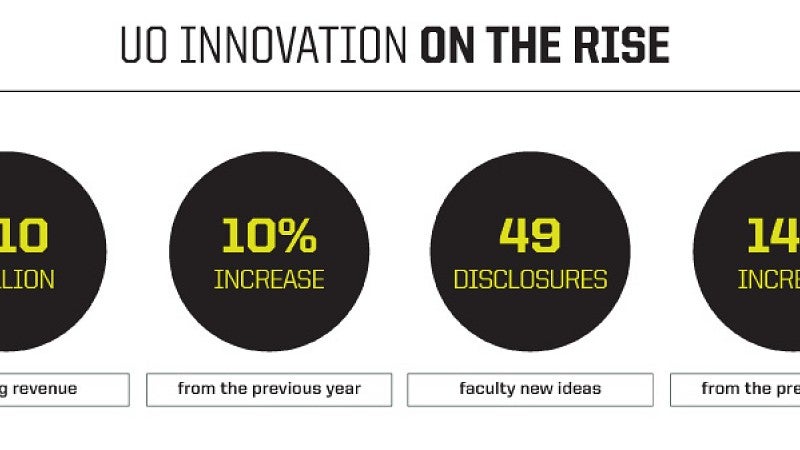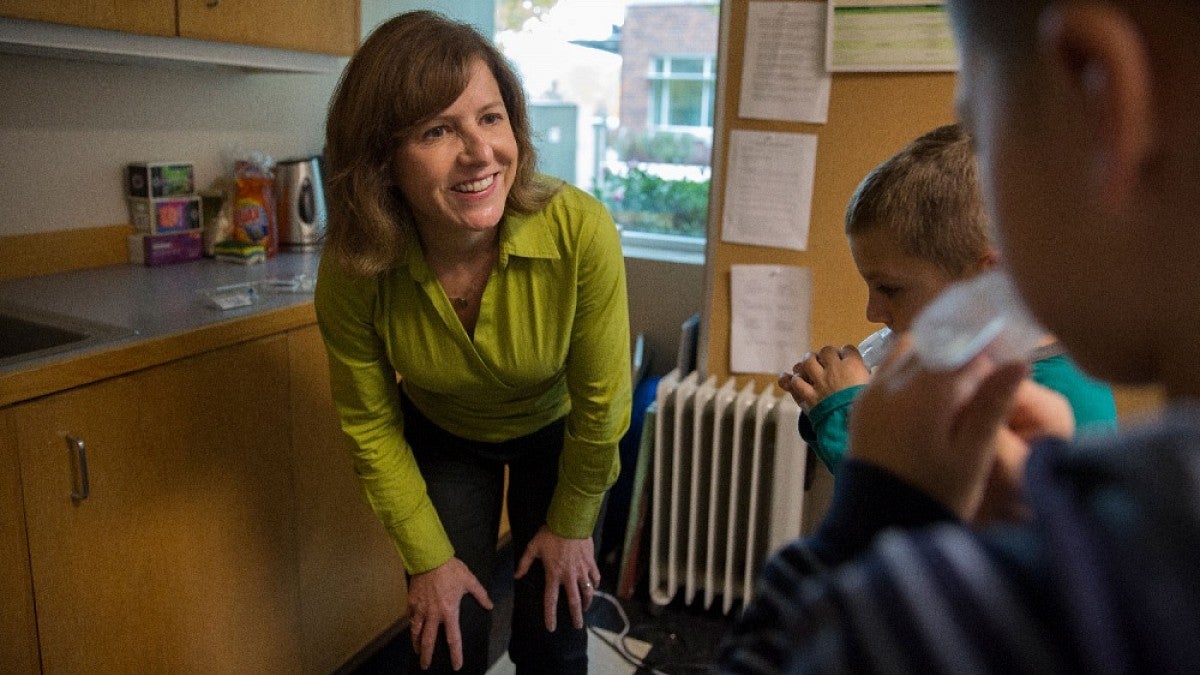In August 2018, a team of UO faculty members led by Leslie Leve, a professor in the Prevention Science Institute and the College of Education, secured a $12.5 million grant from the National Institutes of Health to study child growth and development.
The award, which supports a pivotal role for the UO in a landmark study on the environmental influences on child health outcomes, was one of 572 grants received by UO investigators during the 2019 fiscal year. It represented one of many bright spots in a successful fiscal year in which UO researchers brought in an estimated $126 million in grants, contracts and competitive awards, an increase of about $3 million, or a 2 percent uptick, from the previous year.
The year’s biggest increase came in the number of multiyear award commitments – grants that stretch out into the future beyond the 2019 fiscal year. The UO had $163 million in new awards in the 2019 fiscal year, a 70 percent increase from the previous year when the university recorded $96 million in new award commitments.

The UO had six awards with a total commitment of more than $3 million in the 2019 fiscal year versus four such awards in the 2018 fiscal year. David Conover, vice president for research and innovation, pointed to a renewed emphasis on the pursuit of large-scale research grants, such as the record-setting $32.6 million grant received by the College of Education.
“The big story this year was big awards,” Conover said. “The total value for our top five largest awards in 2018-19 averaged twice as much as the previous year.”
Conover highlighted UO’s research metrics in his Oct. 14 State of Research talk. The numbers, which cover the 2019 fiscal year starting on July 1, 2018, and ending June 30, were released in the 2019 Sponsored Projects Services Report published by the UO’s Office of the Vice President for Research and Innovation.
“For the third consecutive year, our research and innovation numbers continued to climb, and for that, we have our outstanding faculty to thank,” Conover said. “They are creating new knowledge, making exciting discoveries and conducting transformative research in laboratories, libraries and creative spaces across our campus, and the impact of their work can be felt throughout the state of Oregon and beyond.”

All told, UO investigators submitted 1,059 proposals during the 2019 fiscal year, an increase of 3 percent from the previous year. Examples of new 2019 awards spanning the UO’s many departments and institutes included:
- A $60,000 grant to Courtney Thorsson, an associate professor in the Department of English, from the National Endowment for the Humanities, to conduct research for an interpretive cultural history of a group of African American women writers that met in New York from 1977 to 1978.
- A $7.6 million grant to biologists Karen Guillemin, Judith Eisen and Brendan Bohannan and biophysicist Raghuveer Parthasarathy from the National Institutes of Health to study the potential health benefits of bacteria.
- A $1.2 million, three-year grant to a team led by UO associate professor of multimedia journalism Ed Madison, from the National Science Foundation. The team, which includes associate professor of education Jenefer Husman and courtesy research assistant professor of education Ross Anderson, will pursue a creative, interdisciplinary solution to the student achievement gap for underrepresented groups in STEM courses.
- A $2.1 million award to Diana Libuda, an assistant professor in the Department of Biology and the Institute of Molecular Biology, from the National Institutes of Health to study recombination pathways and partner choices during meiosis.
- A $595,000 grant to Craig Young, director of the Oregon Institute of Marine Biology, from the National Science Foundation to study deep-sea organisms in hydrothermal vents and methane seeps on the ocean floor.
- A $175,000 grant to Stephanie Wood, a research associate in the College of Education, from the National Endowment for the Humanities, to research Native American histories along the Lewis and Clark Trail.
- A $649,000 grant to Daniel Lowd, an associate professor in the Department of Computer and Information Science, from the Department of Defense to develop a computer algorithm.
For a rundown of all of the awards received in the past year, visit the UO’s monthly award reports page.
UO’s innovation metrics also rose during the 2019 fiscal year, according to the UO’s Innovation Partnership Services unit, which works with UO innovators, the public and industry to accelerate the adoption of products derived from UO research and education.
Chuck Williams, director of the unit and the UO’s associate vice president for innovation, said UO researchers continued to translate innovations into impact, with an increase in nonexclusive licensing as well as agreements for the exchange of data, software, research materials and other proprietary materials, a trend driven by increased activity in UO’s College of Education and the arrival of new science faculty in programs such as the Data Science Initiative.

UO innovation metrics from the past year included:
- Disclosures — inventions, copyrighted works, biological materials, software and related trademarks — jumped to 49 from 42.
- Science-based invention disclosures jumped to 20 from 18.
- Patent filings increased from 17 to 19.
- The UO is now ranked no. 5 in the Association of American Universities in licensing per research dollar.
- The UO received $10 million in licensing income, an increase of 10 percent from the previous year.
The UO spun out one company founded on UO-licensed technology in the 2019 fiscal year, along with a constellation of student-founded companies, licensing to UO’s industry research partners, and developing several startups for launch next year. The digital mental health firm Ksana Health grew out of research conducted by UO psychology professor Nick Allen and received a boost in the form of a Venture Launch grant, a program that was recently revived after a six-year hiatus to support qualified startup companies.
Ksana Health was one of three Innovation Seed Fund awardees. Additional awardees included the infant hearing assessment firm Perceptivo, LLC, which was launched by UO biology professor Terry Takahashi and Avinash Singh, a research associate specializing in neuroscience, and a yet-to-be-named company translating technology for a sulfide-sensing device launched by chemistry professors Mike Pluth, Darren Johnson and Michael Haley.
The seed funding program provides translational research grant funding to enhance the probability that research discoveries will be transformed into new products, services and companies that contribute to the Oregon economy.
“UO researchers are more interested than ever in translating their ideas from innovation to impact and we are here to help them in those efforts,” Williams said. “We look forward to even more innovation activity in the year ahead with the opening of the Phil and Penny Knight Campus for Accelerating Scientific Impact, continued UO collaborations with private industry, and the establishment of new partnerships that will help bring research discoveries to the marketplace.”
—By Lewis Taylor, University Communications


